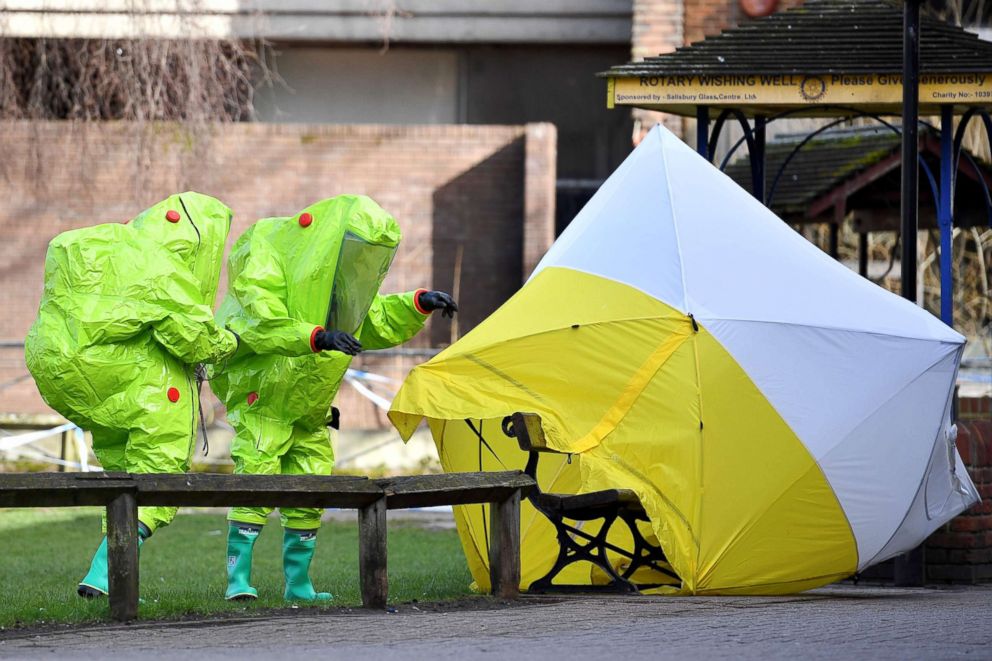UK on alert for possible Russian cyberthreat, foreign secretary says
The foreign secretary said Russia may retaliate after sanctions, Syria attack.
LONDON -- Britain faces a looming threat of possible cyber-attack from Russia, the U.K. Foreign Secretary Boris Johnson said on Sunday.
Johnson warned during a BBC broadcast on Sunday of the possibility that Russia may retaliate against U.K. sanctions following the Salisbury attack and Western-allied strikes on Syria by targeting power networks or national infrastructure in Britain.
"When you look at what Russia has done, not just in this country, in Salisbury -- attacks on TV stations, on the democratic processes, on critical national infrastructure -- of course we have to be very cautious indeed," he said.

Johnson’s warning comes after reports that a Russian-linked campaign to spread disinformation, following the U.S. allied airstrikes on Syria, was growing in intensity.
Over the weekend, the Pentagon announced there had been a significant surge in the number of Russian fake accounts promoting false information.
"The Russian disinformation campaign has already begun," a Pentagon spokesperson said in a press conference. "There has been a 2,000 percent increase in Russian trolls in the last 24 hours."
In the U.K., media reports highlighted the threat that "kompromat," or compromising material, collected through cyber-attacks could be used against British government officials. The Federal Security Service of the Russian Federation, or FSB, has been known to use kompromat against foreign officials, although the Russian government often denies the claims officially.
In 2009, the State Department made a formal complaint to Russia over a video apparently featuring a U.S. diplomat and prostitutes in a Moscow hotel. The Russian Foreign Ministry at the time declined to make any comment on the footage.
In early 2017, the published Steele dossier included unverified claims about the then President-elect Trump, including salacious allegations involving Russian prostitutes.
After the dossier was published, a spokesman for the Russian President Vladimir Putin told British journalists "the Kremlin does not collect kompromat."
Before the former Russian double agent Sergei Skripal and his daughter were poisoned by a nerve agent in January, the head of the U.K.’s National Cyber Security Centre warned that a major cyber-attack on the U.K. was a matter of "when, not if."

Critical national infrastructure in the U.K. has sustained cyber-attack damage in the past, such as the ransomware attack on the National Health Service in May 2017. Almost 7,000 appointments were cancelled, and almost 20,000 appointments affected as a result of the attack, the BBC reported. The attack was widely attributed to the Lazarus Group, based out of North Korea.
Ransomware is a type of program used for cybercrime that involves the hijacking of operating systems with a ransom demand to the user in order to retrieve their data and access to their computer.
The government is limited in what it can do to mitigate the risk of cyber-attacks on U.K. infrastructure since much of it is privatized, according to Robert Pritchard, the former deputy head of the U.K.'s Cyber Security Operations Centre.
"For certain parts of critical national infrastructure though, [the government] is able to do more to mitigate the risk, and direct action," he told ABC News. "The problem with the NHS is they've been underfunded for years and this makes it hard. It is basically a rambling mansion of I.T. infrastructure and it becomes a matter of making sure any one of a hundred glass windows doesn't get smashed."
But, Pritchard said the government developed a team to monitor cyber security early on and in that respect is one of the most well-prepared to respond when necessary.
"The U.K. is really well-equipped to defend against cyber-attack," he said. "It was the U.K. that set up the first organization to do this back in 1999 with the National Infrastructure Security Co-Ordination Center."
While cybersecurity hasn't politically been a focus until recently, he added, the British government has been working on these defenses for many years.




